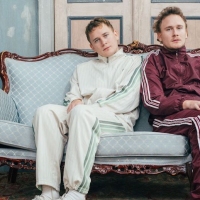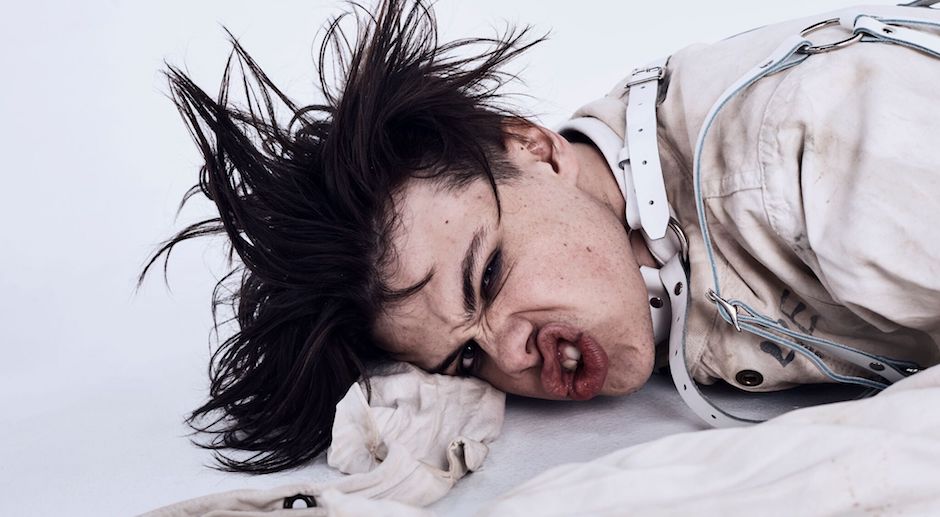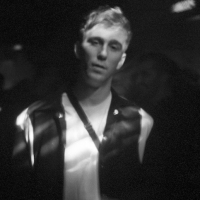 Cosmo's Midnight break down every track on their debut album, What Comes NextThe Sydney twins and some of the album's guest collaborators detail the long road to album number one – out now through Sony/RCA Records.
Cosmo's Midnight break down every track on their debut album, What Comes NextThe Sydney twins and some of the album's guest collaborators detail the long road to album number one – out now through Sony/RCA Records.

Punk, Politics and Polygraph Eyes – An Interview with YUNGBLUD
With the release of his debut album under his belt and a run of Australian shows to come, we catch up with YUNGBLUD – the future of music.
YUNGBLUD has no reason to be political and overly-opinionated. As the pop-punk creation of 19-year-old Doncaster teen Dominic Harrison, the fierce-eyed musician could be like many others in the pop music world – occasionally present and vocalised on topics that may affect them personally, but generally, quiet and reserved in the grander scheme of the things.
This silence of the world’s most influential pop stars politically is, in fact, something Harrison is striving to correct in his music and presence. “In popular music, I think there is a real lack of [politics]. I think people are very afraid of being straight up because they're scared of the repercussions,” he says, speaking the in the weeks leading up to his debut album release. “Whereas I just wanna be straight up because that's what I am, you know. If you're not using your art to fucking say something, you're not an artist; you're a singer, and I don't wanna be a singer.”
21st Century Liability – YUNGBLUD’s debut album – embodies Harrison’s drive to create meaningful art in a time when it’s most needed, uniting confrontational and provocative lyrics with catchy and accessible pop-punk which he says, acts like a “trojan horse” for the album’s deeper themes. “On the outside it sounds so fun and you can jump about to it, but when you really listen to the lyrics there’s something darker and deeper going on,” he explains, and when dives into these darker topics, he doesn’t back away.
Across the album, Harrison explores many of the world’s most important political and social issues in punchy, often-less-than-three-minute bursts of pop-punk energy. Machine Gun (F**K The NRA) is a glaring example from the album, emphasising the United States’ gun control debate that was sparked by a realisation that it was easier to buy an assault rifle than a beer in a trip to the US. The track before this, Medication, explores the impact technology may have on our emotional health and wellbeing, while Kill Somebody and Die For The Hype discusses struggles with anxiety and conformity in the current socio-political age.

Polygraph Eyes, a single that catapulted Harrison into the commercial world after the success of his break-out anthem I Love You, Will You Marry Me, carries one of the album’s most crucial and relevant themes, focusing on sexual assault, consent and the common lad mentality that’s often faced on a night out. “Leave it alone mate, she doesn’t want to go home with ya” he chants in the chorus, influenced by night outs where he would see drunk women pushed into taxis by men not nearly as drunk. “She can’t even run / She can’t even walk / She slurs when she speaks / But you hear what you want when she can’t even talk,” he repeats in the song’s outro.
Over the past year, YUNGBLUD has become an important name in the world’s musical world. By intertwining the album’s darker themes and messages with a liveliness and drive adored by his predominately young audience, Harrison is educating and informing the masses through his music. He’s giving the young generation a voice while also enlightening those who may not be able to tackle some of these issues with the confusing jargon and politics sometimes associated with them. “Making a connection with other young people is what fuelled this whole album,” he says. “I don’t have the answers to all these problems, but I want to do what I can to make other people feel like their voices are important. It’s only when we all come together and speak our minds that we can really change things in a powerful way.”
21st Century Liability is an album built on outrage, political confrontation and emotion. Reflecting on the album’s creation, how do you feel now? Was writing the album somewhat of a cathartic experience?
Firstly, I’m just so excited to get it out. It’s been amazing; I’ve literally not slept in two weeks because – oh my god – my debut album is coming out. It’s amazing. And 100% – it's literally an accumulation of all the emotions and anger I’ve felt kind of all my life leading up to this. It’s been such an incredible release to just get them out into the atmosphere and to be able to connect with people with my music, you know? I just want this album to be an outlet for people that feel like their voices can’t be heard or they can’t be themselves.
The album has some incredibly important themes – sexual assault and consent, gun control, the effect of technology on our emotional well-being for examples. Do you hope that talking about these issues in your music will increase the awareness of them to your audience? Has that always been a goal of the YUNGBLUD project?
I think I mix together talking about issues with energy because there is nothing more powerful than energy for me. And at the end of the day, young people are so intelligent now – so It's so incredible to see the reaction from them, and the messages that I get across my DMs. Like, young people are relating to what I’m saying because we’re all feeling it. We have access to so much information nowadays. We’re not just young kids rebelling against the system because that sounds naive. We have outlets to so much information that we’ve become so clued open to the world.
Ultimately, I don’t want to tell people what to think, you know, because I’ve not got all the answers – I’m just simply saying what I think. I just want to encourage people, young people especially, to say what they think, because the more we talk about it, the more chance it's got of getting heard. It’s so funny because people say just cause I’m talking about politics, young people are gonna switch off. But no, god no, like, politics has never been more relevant in the world, so I just can't believe more people aren’t talking about it in popular music, It baffles me.
What do you want people to take from your music and its themes?
I want to mix it up and I want it to be fun. You know, I do want it to be “oh this song’s an absolute banger and I can’t get it out of my head, but it makes me, it gets in my head, and it makes me feel empowered, and it relates to me on a level that is real.” I think, to me, that all I just wanna be is real. Because to me, if it is real, I will resonate with it and if I can affect someone in their personal life from my music and what I’m saying, that’s the best thing in the world.

You mentioned that you feel pop music often avoids these topics due to controversy. Do you feel that nowadays, more artists are stepping up and being political or taking on political themes in their music? Or is still mostly limited to other genres, like hip-hop?
To me, ya I think in popular music, I think there is a real lack of it. I think people are very afraid of being straight up because they're scared of the repercussions, you know? Whereas I just wanna be straight up because that's what I am. If you're not using your art to fucking say something, you're not an artist, you're a singer, and I don't wanna be a singer.
That's why hip-hop to me is exciting - it's saying something. I might not necessarily agree with what it’s saying all the time, but it’s saying something; it's giving me a fire in my belly that the Clash did, that the Arctic Monkeys did, that Eminem did, that Oasis did, Busta Rhymes did. You know? I mean, that's exciting for me, and that's what I want to bring into pop music – a message, you know?
What do you want to see from big-name pop musicians politically?
I just want to be able to talk about shit that’s not just “Oh I love you so much baby I’m gonna shit myself,” or fucking how many times can I say “bitch” and sit on a car and throw money at the 15 guys nodding their head awkwardly next to me.
-
"If you're not using your art to fucking say something, you're not an artist; you're a singer, and I don't wanna be a singer."
-
Polygraph Eyes has a very timely theme of sexual assault and consent. I’m not sure if it’s the same in the UK, but Australian music events have a massive problem with sexual assault – it seems that every single festival ends with a complaint or charge regarding groping or other forms of assault. What inspired you to write this song?
I think, initially, this problem has become far too normal. It was something I experienced seeing growing up. I used to go out in the north at 14 with a fake ID, and see these drunk girls stumbling out of nightclubs with boys that weren’t nearly as drunk as they were. And, do you know the mental, fundamentally, crazy messed up thing? It was that I didn't realise that it was wrong until I’d grown up, until I moved down to London and saw the world from a real perspective.
We’re brought up in a society where this lad mentality is so vastly accepted that it’s normalised. And for me, I just think that's disgusting, and I believe that it's not just black or white. I want to write this song because I want boys to listen to it, watch the video and go “oh my god, just because a girl wants to wear a short skirt as possible or get as drunk as she wants, that does not give me the right to take advantage of that fact” or “oh my god, I've done that.”
The more we talk about it, the more the awareness is raised, and people who wouldn't believe it’s wrong can learn and see that it's wrong and it’s so important that this issue can be talked about, and that it can be stamped out.
Do you, as an artist, do anything to prevent or discourage these types of actions at your shows?
Ya, of course man, and it’s scary man – it’s crazy, but I always look out at my gigs. I think even when the lads get a bit rough I always tell them to calm it down a bit. At the end of the day man, I want my gigs to be a happy environment – my version of punk isn't to divide, it’s to unite for one greater cause. I want it to be happy and to feel safe. I don't think anyone would dare [show these actions] because I’d call them straight out on it.
-
"I want my gigs to be a happy environment - my version of punk isn't to divide, it's to unite for one greater cause."
-
You and your live show are back in Australia later this year, and from what I’ve seen, you’ve got quite an energetic and commanding stage presence. You mention that you have ADHD, which leaves you feeling really energetic. Can you tell us how you channel this energy into your live show?
I don't know really, it just happens as soon as like three minutes before. I'm usually wired all day, but three minutes before something just switches in my brain. No matter how tired I am, no matter what the circumstances are, soon as that intro tape goes on and I hear the sound of the crowd and I hear the bass drum, I just go into my own head for an hour and it's the one place that I'm fundamentally just myself and I’m allowed to be myself without anyone looking at me or looking at me like I'm a nutcase. I have the microphone for 40 minutes to an hour and I can say whatever I want, and you know it's the best place in the world, it's like, incomparable.
YUNGBLUD’s debut album 21st Century Liability is out now via Locomotion/Geffen Records.
 Cosmo's Midnight break down every track on their debut album, What Comes NextThe Sydney twins and some of the album's guest collaborators detail the long road to album number one – out now through Sony/RCA Records.
Cosmo's Midnight break down every track on their debut album, What Comes NextThe Sydney twins and some of the album's guest collaborators detail the long road to album number one – out now through Sony/RCA Records.
 Meet the UK's most exciting musical chameleon, SG LewisWe talk to the continually evolving London musician about UK club culture, live shows and his three-part debut album.
Meet the UK's most exciting musical chameleon, SG LewisWe talk to the continually evolving London musician about UK club culture, live shows and his three-part debut album.